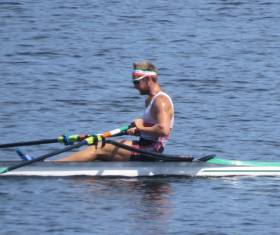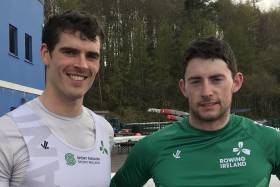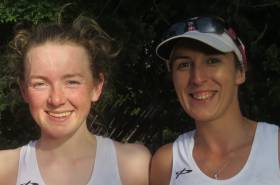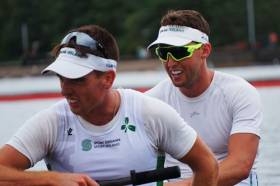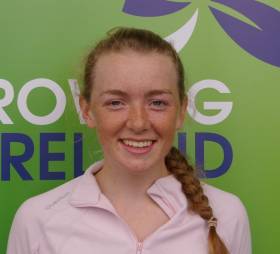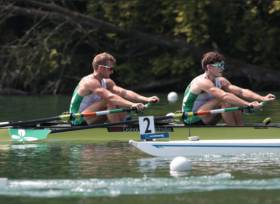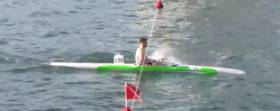Displaying items by tag: European Championships
#Rowing: Gary O’Donovan took sixth place in his heat of the lightweight single sculls at the European Rowing Championships in Lucerne this morning. The Skibbereen man, competing for the first time at this level in a single, found himself at the back of the field early on and while he pushed into fifth he saw the race disappear from him in the final sprint. Martino Goretti of Italy set the early pace and won.
European Championships, Lucerne, Day One (Irish interest)
Men
Double – Heat One (First Two to A/B Semi-Finals; rest to Repechages): 1 Ireland (P Doyle, R Byrne) 6:26.53, 2 Romania 6:29.62.
Lightweight Single Sculls – Heat One (First Two to A/B Semi-Finals; rest to Repechages): 1 Italy (M Goretti) 7:05.54, 2 Switzerland (J Schaeuble) 7:06.73; 6 Ireland (G O’Donovan) 7:34.73.
#Rowing: Philip Doyle and Ronan Byrne gave Ireland a top-class start to the European Rowing Championships in Lucerne this morning. They won their heat of the double sculls with a powerful display, seeing off a challenge by Romania, who gave way only at the very finish, to win by over a length. The rest of the field let these two crews go, as they had wrapped up the two qualification spots for the semi-finals.
European Championships, Lucerne, Day One (Irish interest)
Men
Double – Heat One (First Two to A/B Semi-Finals; rest to Repechages): 1 Ireland (P Doyle, R Byrne) 6:26.53, 2 Romania 6:29.62.
Ireland Pair to Miss Europeans but Set For World Cup
#Rowing: Aifric Keogh has had to withdraw from the Ireland team for the European Championships at the end of the month because of illness. The Galway woman was to form a pair with Monika Dukarska in Lucerne (May 31st to June 2nd), but this crew will now travel to the second World Cup in Poznan, Poland on June 21st to 23rd. A women’s four will also be entered in Poznan, which was not originally pencilled in as an event for Ireland crews.
#Rowing: Denise Walsh and Aoife Casey gave Irish fans plenty to cheer about at the European Rowing Championships in Strathclyde Park in Scotland. The Ireland lightweight double fought it out with Germany in an exciting B Final. Germany’s Leonie Pless and Katrin Thoma led at halfway, but Walsh and Casey pushed into that lead for the remaining 1,000 metres. As they crews came to the line, cheered on by the crowd, Ireland upped the rate. The Germans held out and won by one-third of a length.
European Rowing Championships, Day Four (Irish interest)
Women
Lightweight Double Sculls – B Final (Places 7 to 11): 1 Germany 7:11.14, 2 Ireland (A Casey, D Walsh) 7:11.77, 3 Austria 7:15.63.
O'Donovans Come out on Top in Tight European Rowing Semi-Final
#Rowing: Paul O’Donovan and Gary O’Donovan won an extremely close semi-final to qualify for the A Final of the lightweight double sculls at the European Rowing Championships in Strathclyde in Scotland this morning.
Poland and the Czech Republic were the leaders to halfway. By 1500 metres, Ireland were in the lead. But Poland, Britain, Belgium and the Czech Republic were within a boat length of them. Belgium provided the best test for the Irish and took second, with Poland pipping Britain – by .22 of a second – for the third and final qualification place.
In the other semi-final, France missed out as Norway took first, Italy second and the Ukraine a surprise third.
European Championships, Day Three, Strathclyde, Scotland (Irish interest)
Men
Pair – B Final (Places 7 to 12): Britain 6:36.77; 5 Ireland (M O’Donovan, S O’Driscoll) 6:44.58.
Lightweight Double Sculls – Semi-Final Two (First Three to A Final; rest to B Final): 1 Ireland (G O’Donovan, P O’Donovan) 6:28.14, 2 Belgium 6:28.68, 3 Poland 6:29.27.
#Rowing: Mark O’Donovan and Shane O’Driscoll finished a close-up fifth in their semi-final of the pairs at the European Rowing Championships in Strathclyde, Scotland. France were the dominant force and took the first of the three qualification places. Italy were the most consistent challengers. Ireland held sixth and fifth through the middle of the race, but all the crews were in the hunt for the second and third places in the final quarter. Belarus drove into second; Italy took third. O’Donovan and O’Driscoll came with a sprint and almost caught the Netherlands, who took fourth.
European Rowing Championships, Strathclyde, Scotland – Day Two (Irish interest)
Men
Pair – Semi-Final Two (First Three to A Final; rest to B Final): 1 France 6:26.94, 2 Belarus 6:29.06, 3 Italy 6:29.46; 5 Ireland (M O’Donovan, S O’Driscoll) 6:31.47
Women
Lightweight Double Sculls – Repechage One (First Two to A Final; rest to B Final): 1 Switzerland 7:03.89, 2 Britain 7:06.04; 3 Ireland (A Casey, D Walsh) 7:11.31.
Casey and Walsh Set for B Final at European Rowing Championships
#Rowing: Ireland finished third in the repechage of the lightweight women’s double sculls and will compete in the B Final at the European Rowing Championships at Strathclyde in Scotland. Switzerland and Britain took the two A Final places which were on offer, racing clear of the rest of the crews for most of the contest. Aoife Casey and Denise Walsh led the rest, but could not close the gap.
European Rowing Championships, Strathclyde, Scotland – Day Two (Irish interest)
Women
Lightweight Double Sculls – Repechage One (First Two to A Final; rest to B Final): 1 Switzerland 7:03.89, 2 Britain 7:06.04; 3 Ireland (A Casey, D Walsh) 7:11.31.
#Rowing: Paul O’Donovan and Gary O’Donovan won their heat of the lightweight double sculls to qualify confidently for the A/B semi-finals at the European Championships in Strathclyde. France, with Pierre Houin in the stroke seat and Thomas Baroukh in the bow, gave Ireland a good race. It was clear by the 1500 metre mark that these two crews were set for the semi-finals, but France would not let Ireland gain a clearwater lead. At 1750 metres the O’Donovans moved from two-thirds of a length to one length, but France stayed nipping at the lead to the line.
European Rowing Championships, Strathclyde, Scotland (Day One, Irish interest)
Men
Pair – Heat Three (First Two to A/B Semi-Finals, rest to Repechage): 1 Belarus 6:37.38, 2 Britain 6:37.76; 4 Ireland (M O’Donovan, S O’Driscoll) 6:48.94.
Lightweight Double Sculls – Heat Three (First Two to A/B Semi-Finals; rest to Repechage): 1 Ireland (G O’Donovan, P O’Donovan) 6:27.99, 2 France 6:29.83.
Women
Lightweight Double Sculls – Heat One (Winner to A Final; rest to Repechage): 1 Poland 7:08.54; 4 Ireland (A Casey, D Walsh) 7:22.02.
O'Driscoll and O'Donovan Race in European Rowing Heat
#Rowing: Ireland’s Shane O’Driscoll and Mark O’Donovan finished fourth in their heat of the pair on the opening day of the European Championships in Strathclyde, Glasgow. Just two crews go through to the A/B semi-finals, and Ireland face into a repechage.
The race was well jugdged by Matthew Rossiter and Oliver Cook of Britain. They held a place behind leaders Belarus and the Netherlands until the final quarter, then elbowed their way into second. The Netherlands cracked and finished third.
O’Driscoll and O’Donovan rowed well, but were not part of the final charge for qualification places and eased off with an eye on the repechage.
European Rowing Championships, Strathclyde, Scotland (Day One, Irish interest)
Men
Pair – Heat Three (First Two to A/B Semi-Finals, rest to Repechage): 1 Belarus 6:37.38, 2 Britain 6:37.76; 4 Ireland (M O’Donovan, S O’Driscoll) 6:48.94.
#Canoeing: Ireland’s Ronan Foley won the European junior championships in the canoe marathon K1 today. He raced remarkably well and was completely in charge at the end of an interesting 22.6 kilometre race in Metkovic in Croatia.
Three paddlers – Foley of Ireland, Thorbjorn Rask of Denmark and Vince Petro of Hungary – broke away on the second of six laps. They stayed together until the final lap, when Foley used the final portage to secure gold. He sprinted away from the other two and when he got back in the water he extended the advantage.
Matt McCartney of Celbridge Paddlers finished 13th.
Canoe Marathon European Championships, Metkovic, Croatia
Men, K1, Junior: 1 Ireland (R Foley) 1 hr 41 min 2.63 sec; 13 McCartney at 7 min 16.5 sec.


























